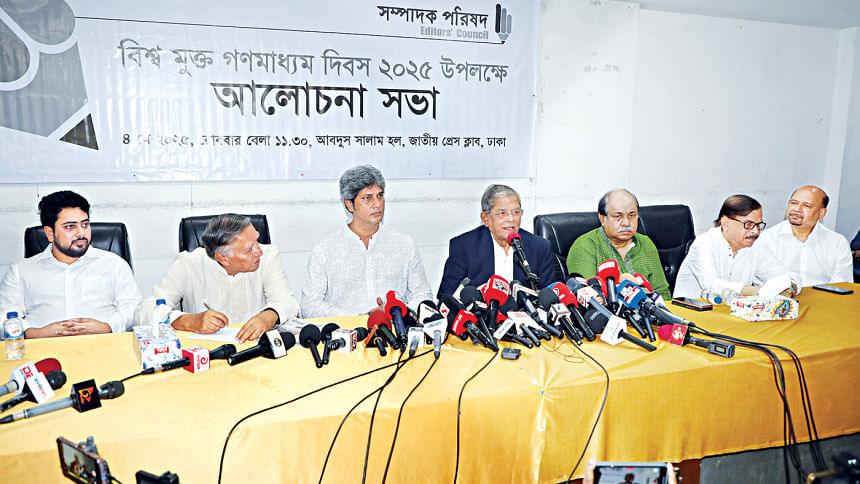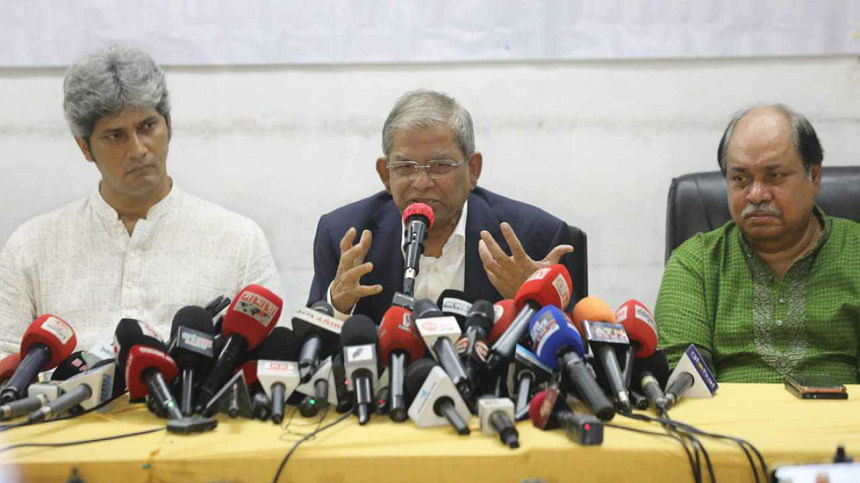Democracy can’t do without a free press

Political parties have stressed their commitment to ensuring press freedom, recognising it as essential for democracy and good governance, and warning that its absence leads to fascism.
They also emphasised the need for upholding the values of ethical journalism and said the media should not be used for corporate or other vested interests.
The remarks were made at a discussion organised by the Editors' Council to mark the World Press Freedom Day at the Jatiya Press Club yesterday.
In his speech, BNP Secretary General Mirza Fakhrul Islam Alamgir said, "We can assure you that we [the BNP] have always been, and will continue to be, in favour of press freedom -- whether we are in government or not."
He highlighted his party's history of standing against the oppression faced by the media, as well as the "clearly fascist" laws imposed on the media under the previous regime.
"We have fought before, we are still fighting, and we will continue this fight. We will never support unjust imposition of one's views on others. We will, of course, firmly uphold the right to freedom of opinion.
"If we ever get the chance to govern, we will institutionalise press freedom. If we remain in opposition, we will continue our fight to ensure it."
Fakhrul also pointed out that it was the BNP that first paved the way for press freedom in 1975, when all but four newspapers were shut down under the one-party rule of BAKSAL.
"We have fought before, we are still fighting, and we will continue the fight. We will never support unjust imposition of one's views on others. We will, of course, firmly uphold the right to freedom of opinion."
He acknowledged his party's shortcomings but emphasised its contributions to press freedom, noting that numerous media outlets were established during its tenure and that journalists faced considerably less oppression compared to the previous government.
However, Fakhrul expressed concern about how his words might be interpreted by specific outlets, how they would be published, or how social media would portray them. "For those of us in politics, this is a matter of concern, especially with the rising trend of character assassination on social media; it's difficult not to be worried."
Regarding this trend and mob attacks, he noted, "If I assume that only my views are correct, then we will never succeed in democratic practices."
He added that, likewise, if one believes that it is only acceptable when a media outlet says positive things about them and unacceptable when it does not, such mindsets will also hinder democracy.
Refuting the narrative that the BNP rejects reforms and only demands elections, he stated, "The truth is, reforms began with us. We were the ones who transitioned from a one-party system to a multi-party system. We enabled the shift from a presidential to a parliamentary democracy. Despite opposition, we introduced the caretaker government provision in the constitution."
Fakhrul emphasised that the 1971 Liberation War remains central to the BNP's ideology and that the party will never compromise on this issue.
"Through the uprising against 15 years of authoritarian rule, there is now an opportunity to begin a democratic system, but democracy needs to be practised, just like a tree needs regular care to grow," he added.
Nagorik Oikya Chairman Mahmudur Rahman Manna called the interim government "the most media-friendly government" since Bangladesh's independence, but questioned why it had not withdrawn cases against journalists filed by the previous government under the Digital Security Act.
Convener of the National Citizen Party Nahid Islam, in his speech, said Bangladesh had improved its global ranking on press freedom this year, but it still remains in the lower tiers.
He pointed out that during the last 16 years under the Hasina regime, there had been legal and cultural interventions by the media. "We need to move away from a media environment where the Awami League's ideological influence and authoritarian control have taken hold … Media institutions themselves should propose and uphold principles of good governance."
Nahid also called for transparency in media ownership and investments, as the media itself has demanded clarity on the income sources of political activists.
He added that his party believes in free press, as the July movement grew from restrictions on freedom of speech.
Nahid said that during his tenure as information adviser there was no government pressure on the media. "There were some social pressures on certain media outlets, but we always supported the media houses. Sometimes we criticised their roles in the previous regime … but nothing was done to shut down any media houses."
Chief Coordinator of Ganosamhati Andolon Zonayed Saki said a free press is the most basic requirement for a democratic state.
"We need to create a situation where people trust the media more than the courts, even when justice is denied," he said, adding that his party is committed to building a society free from fear.
Saki further stated that a democratic system cannot function without media freedom.
"The laws that silence the media must be revoked," he said, while also calling for media accountability to prevent arbitrary practices.
"Some business groups have created media organisations to serve their own or their business interests. Media owners must also be held accountable," he said, suggesting that there should be a clear policy on ownership.
He also highlighted mob attacks as a new phenomenon, where certain individuals achieve their goals by issuing threats. "If these are not stopped, the existence of the state will be under threat."
Mahfuz Anam, editor and publisher of The Daily Star and president of the Editors' Council, said it was a matter of disgrace that 266 journalists have been charged in cases related to alleged murder or violence.
Despite Bangladesh rising 16 places to rank 149th out of 180 countries in the latest World Press Freedom Index, such mass cases against journalists remain a serious concern and contradict the principles of media freedom, he opined.
"This does not mean that no one has committed any wrongdoing. If someone has done wrong, they should be properly charged and punished, and we [the Editors' Council] will not stand by them…. But it's been over seven months since some journalists have been caught up in these cases, yet there has been no progress in the investigations. As a result, the accused face reputational harm and live in fear of mob attacks," he added.
"At this moment, 13 journalists are in jail, not getting bail, and no legal process is ongoing. People do have the right to file cases, but the question is whether the government will act when the law is abused by some quarters.
"People hope the current government will reform and strengthen democracy, and reinforce freedom of speech. However, harassing journalists is not only disheartening but also tarnishes Bangladesh's image globally," he said, urging the government to review the cases against journalists.
Manabzamin Editor Matiur Rahman Chowdhury noted how World Press Freedom Day was being celebrated while journalists in Bangladesh are losing their jobs for asking questions.
"The situation, however, has improved compared to last year."
He also highlighted divisions within the media, which are causing significant damage to the industry. "Such divisions must end."
New Age Editor Nurul Kabir stated that a free press does not depend on journalists alone, but largely on lawmakers, politicians, and the state of democracy. "Bangladesh is still in the lowest global position for press freedom, which is shameful for journalists, harmful for the people, and dishonourable for the politicians … They [politicians] are responsible for the laws that prevent the press from doing its job properly."
Kabir acknowledged the interim government's move to carry out reforms in various sectors, including the media, but said it was unnecessary to wait for the commission's report to eliminate some controversial laws. "I am glad that the government initiated a declaration based on national consensus, but it seems deceptive when it speaks of minimum consensus among political parties.
"It seems the government has no philosophical stance … There are different political parties with different views."
He added that some parties don't even recognise December 16 as Bangladesh's Victory Day.
Kabir concluded that the consensus should be based on the core values of the proclamation of independence: equality, democracy, and the protection of the rights of all citizens.
Jatiya Press Club President Hasan Hafiz also spoke at the event, which was moderated by Dewan Hanif Mahmud, editor of Bonik Barta and general secretary of the Editors' Council.


 For all latest news, follow The Daily Star's Google News channel.
For all latest news, follow The Daily Star's Google News channel. 








Comments